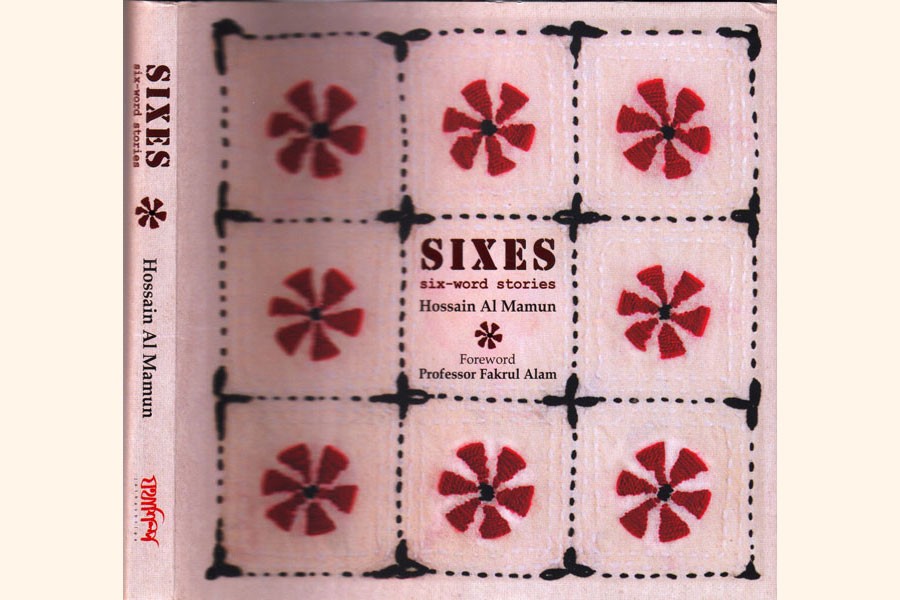Micro-fiction, a sub-genre of short stories, is increasingly becoming popular among many young writers across the globe. Placed within this category, six-word stories or sixes are considered to be the minimum size for such fiction, which are also called 'short short-stories', 'flash fiction', or 'micro-story'. They compress the narratives tightly to provide flashes of sudden truths striking deep inside human beings. Professor Hossain Al Mamun of Sylhet Shahjalal University of Science and Technology is one such home-grown exponent of the sixes, who has recently published the first book of six-word stories in Bangladesh. The square-shaped hard-cover volume also contains stunning pictures and eye-catching illustrations that relate to the themes of the fictions. The idea seems to be quite novel and is likely to emerge as a real treat for the literary connoisseurs of the country.
In his foreword to the book, eminent academic, litterateur-cum-translator Professor Fakrul Alam comments: About Hossain Al Mamun's Sixes: Six-word Stories, one can say, "He read; was inspired; wrote ingeniously".... Certainly Mamun's imagination has been triggered by the formal constraint he has imposed on himself in presenting to us this slim book of six-word stories. The collection he presents to us is proof that you can do quite a lot with very little. A whole life, a telling image, a truth universally acknowledged only when laid bare, verbal and visual wit, some humour, a whiff of poetry - these are some of the gleanings that the perceptive reader will gather from Mamun's collection.
Mamun recalls in the preface how the Nobel Prize-winning novelist Ernest Hemingway (1899-1961) beat the challenge of his fellow writers and won a 10-dollar bet at a lunch by writing a six-word story: "For sale: baby shoes, never worn". It had the basics like other stories - a beginning, the middle and an end. Besides, it had all the elements that make a story great - emotion, detail, and interest. Hemingway's Baby Shoes continues to attract the attention of literary buffs to this day who seek micro-fiction or six-word stories while exploring how much can be written with how little. These are perfect little forms of emotional expression, which can be thrown out into the open for the readers to infer or interpret.
Mamun started writing these stories from February 2018 and their numbers crossed 200 by the end of the year. The themes of his stories have been borrowed from his surroundings, socio-economic and political environment, money-men-women, love and hate, personal and impersonal relationships, life-death-suicide as well as his personal problems, feelings and emotions.
Some of the interesting sixes from Mamun's books are as follows: Dogs bark: Humans die like us; Bachelor's abode: Someone enters, eyes whisper; Rivers bridged: Boats sunk, boatmen disappearing; It came, it ate, it died; Conscience crucified, coward came, candle cried; Mother's favourite saris: Folded, untouched, never used'; Life, birth-death? Or, death-birth?; A pair of shoes - owner unknown; Head and heart - two rivals forever; I, you, we, they ... sheer strangers?; Visitors aplenty, disease diagnosed, deadline descends; Threats known, enemies unknown, knife talk; Banner blazons, placard protests, street squalls; Farmers pray, clouds spray, plants play; Suicide note: 'No candle, only tears'; Smoking cigarettes and killing my sorrows; Pen pervades paper, poetry peeps in; Attending father's wedding, mother's soul smiles!; He receives something, 'no' becomes 'yes'; Divorce note: 'body tested, soul separated; Egalitarianism at dawn, totalitarianism at dusk; The wardrobe weeps, baby's garments sigh; Doctor touches fees, patient stays untouched; Mother's wedding, daughter decorates father's grave; Enjoyed her company; mesmerised - wallet emptied; Killing beasts - thy name is sacrifice; Who gave my vote? - A ghos'; She confesses, 'I am not on pill'; Her last single hope - His pension'; Suicide note: 'Teacher touches, not teaches'; 'Democracy whispers: 'Accept theft, or death'; Baby without legs, plays with shoes.
As Professor Liyanage Amarakeerthi of Sri Lanka points out, Mamun compresses the narratives to the level of words by which flashes of sudden truths strike us deep, at times with a good deal of alliteration that crosses the border of narratives and enters the domain of poetry. And after going through the book, the readers will be in a better position to judge whether it is really possible to write a story with only six words. Treading the path shown by Hossain Al Mamun, we hope more such experimentations will be done by our literary talents in the coming days within the sub-genre of micro-fiction and sixes.
Dr. Helal Uddin Ahmed is a former Editor of Bangladesh Quarterly


